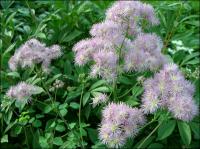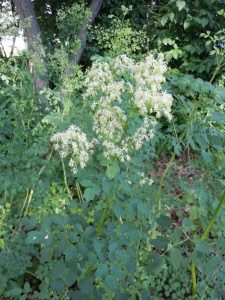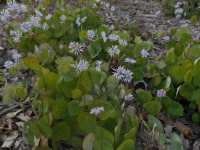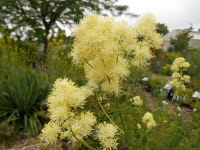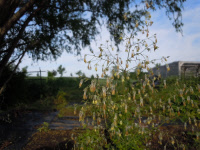Our Plants
Showing 545–552 of 587 results
-
Thalictrum alpinum Alpine meadowrue Z 2-9
Flowering June, purple skirt surrounding dangling yellow anthers on this petite Meadowrue
OUT OF STOCK
Flowering June, purple skirt surrounding dangling yellow anthers on this petite Meadowrue
Size: 8” x 4”
Care: sun to part shade in moist to moist well-drained soil
Native: Mountains Western US, north to Alaska, Eastern Canada, Siberia, Europe & ChinaThalictrum is from Greek meaning “to flourish” or “look green.” In China called “gao shan tang cao.” Collected before 1679.
-
Thalictrum aquilegifolium Meadowrue, Feathered columbine Z 5-9
Delicate lavender to pink panicles of showy stamens in early summer
Delicate lavender to pink panicles of showy stamens in early summer
Size: 36" x 18"
Care: Sun to part shade in moist humusy soil
Native: Europe and North Asia
Wildlife Value: attracts Black swallowtail butterflyThalictrum is from Greek meaning “to flourish” or “look green.” In 1629 Parkinson, apothecary to James I and later, botanist to Charles I, called this “Tufted columbine” a descriptive name, the flowers are tufted, and the leaves resemble those of a columbine. Ancient Romans used it to cure ulcers, the plague and “the Faundife.” Romans stuffed children’s’ pillows with the flowers to bring them wealth. Liberty Hyde Bailey described Thalictrum aquilegifolium as: “A good garden plant and frequently planted,”(1933). Cultivated in U.S. since 1700’s.
-
Thalictrum coriaceum Maid of the Mist Z 5-7
Broad panicle of white flowers with maroon-colored filaments and tips of stigma flowering May to June
Broad panicle of white flowers with maroon-colored filaments and tips of stigma flowering May to June
Size: 3-5’ x 2’
Care: sun to shade in moist to moist well-drained soil
Native: Uncommon, central and southern Appalachian endemic, Pennsylvania to northern Georgia west to West Virginia and Tennessee, primarily in the mountainsFirst described in 1891 in “Torrey Bot. Club” 18:363, 1891. Collected on Rock Table and Stone Mountains in North Carolina in 1891 by J.K. Small (1869-1938) and A.A. Heller and by “Professor Porter in the same region many years before.”
-
Thalictrum dasycarpum Purple meadowrue Z 4-7
Panicles of delicate dangling ivory flowers May to July, purple stems
Panicles of delicate dangling ivory flowers May to July, purple stems.
Size: 4-5’ x 2’
Care: sun to part shade in moist well-drained to moist soil
Native: All North America except Atlantic & Pacific coasts and northern Canada, Wisconsin nativeThalictrum is from Greek meaning “to flourish” or “look green.” Collected for gardens by 1842. Used by Native Americans to enliven horses by giving them seeds or rubbing a poltice on their muzzles. (Pawnee & Lakota). Meskwaki, Ponca & Potawatomi used as an aphrodisiac. Potawatomi smoked a mixture of this and tobacco before meeting their woman. HoChunk used it to perfume smoke. For Potawatomi smoking dried seeds brought luck in hunting. Oneidas consider this a medication for kidney ailments. Ponca boys made flutes from the hollow stems. Winnebago perfumed smoke with this. Lakotaa Sioux fed this to horses to stimulate energy and masticated then rubbed it on their skin to repel insects.
-
Thalictrum flavum syn. T. glaucum Yellow meadrowrue Z 4-8
Fluffy, pale yellow flower clusters in mid-summer atop lacy, blue-gray foliage
Fluffy, pale yellow flower clusters in mid-summer atop lacy, blue-gray foliage
Size: 4' x 2'
Care: Sun to part shade in moist or moist well-drained soil
Native: Spain to NE Africa
Wildlife Value: Attracts Black swallowtail butterfly
Awards: England’s Royal Horticulture Society Award of Garden Merit.The species was identified by Dioscordies in De Materica Medica for medicinal use around 70 A.D. Species grown at America’s 1st botanic garden, Elgin Botanic Garden 1811. This subspecies was probably in gardens before 1900.
-
Thalictrum ichangense Dwarf meadowrue, Chinese meadowrue, in China called “dun ye tang song cao” Z 5-7
Airy sprays of palest of pink flowers in early summer & sporadically reblooming. Pretty foliage - flushed with purple and marbled grey, think Begonia leaves.
Airy sprays of palest of pink flowers in early summer & sporadically reblooming. Pretty foliage – flushed with purple and marbled grey, think Begonia leaves.
Size: 6” x 6”
Care: shade to part shade in moist well-drained soil
Native: forests and damp rocky ledges in Western ChinaDescribed in literature 1888. Collected for the West by Augustine Henry (1857-1930) Irishman who went to China as a physician in the Imperial Maritime Customs Service and stayed 20 years hunting the plants of central China. He collected about 5000 new plants. Used in traditional Chinese medicine.
The species name ichangense comes from the province of Ichang where Dr. Henry found this. -
Thalictrum lucidum Shining meadowrue Z 4-8
In midsummer creamy, fluffy puffs, smelling of roses, atop dark green leaves. Tall, dark & handsome.
In midsummer creamy, fluffy puffs, smelling of roses, atop dark green leaves. Tall, dark & handsome.
Size: 3-6’ x 20”
Care: sun to part shade, moist to moist well drained soil
Native: France & Spain
Awards: Rated as excellent by the Chicago Botanic Garden.Thalictrum is from Greek meaning “to flourish” or “look green.” Lucidum means “bright, shining.” This species collected before 1736.
-
Thalictrum minus ‘Adiantifolium’ Fernleaf meadowrue Z 4-8
Loose panicles of tiny yellowish flowers top fern-like foliage in mid-summer.
Loose panicles of tiny yellowish flowers top fern-like foliage in mid-summer.
Size: 36" x 24"
Care: part shade in moist to moist well-drained soil.
Native: Europe, North Africa & Siberia
Wildlife Value: Attracts Black swallowtail butterfly, Deer resistant.
Awards: Rated as excellent by the Chicago Botanic Garden.Thalictrum is from Greek meaning “to flourish” or “look green.” The species grown by English herbalist Gerard (1545-1612) in the 1590’s.


